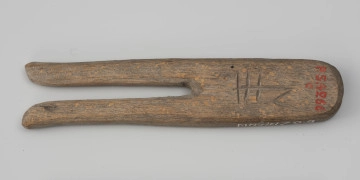
Buckle with ownership mark
1890 — 1950
National Museum in Szczecin
Part of the collection: Traditional fishing
Thrusting tools, found throughout Pomerania are one the oldest and most commonly used in traditional fishing. They differ significantly in design, shape, and size. One tool that deserves special attention is the iron kotwa, a rare type of thrusting tool, whose shape resembles a sharp-toothed anchor. It was used to catch bottom-feeding fish, especially eels. Similarly as in the case of comb-like eelspears, so popular among German fishermen, this tool was used for fishing from a boat. A rope was attached to the round handles placed at the ends of the shaft and used to drag the tool along the bottom. The outer, strongest and longest teeth caught the fish on the remaining smaller spikes. The thrusting tools, including the kotwa, was detrimental to the fish stock. Used during spawning they disrupted the fish population. Sometimes a fish caught into spikes managed to escape, but because of the wounds it became ill and died. For this reason, the regulations prohibiting fishing with thrusting implements were introduced relatively early. In Prussia, such laws were in force since the second half of the 19th century, in Poland since the early 1930s. The presented kotwa from the turn of the 19th and 20th centuries is the only tool of this type in the fishery collection of the Department of Ethnography of Pomerania of the National Museum in Szczecin. It was acquired in 1948.
Agnieszka Słowińska
Author / creator
Dimensions
cały obiekt: height: 58,5 cm, width: 62,5 cm
Object type
point tool
Creation time / dating
Creation / finding place
Identification number
Location / status

unknown
1890 — 1950
National Museum in Szczecin

1880 — 1920
National Museum in Szczecin

unknown
National Museum in Szczecin
DISCOVER this TOPIC
Museum of King Jan III's Palace at Wilanów
DISCOVER this PATH
Educational path
0/500

We use cookies to make it easier for you to use our website and for statistical purposes. You can manage cookies by changing the settings of your web browser. More information in the Privacy Policy.
We use cookies to make it easier for you to use our website and for statistical purposes. You can manage cookies by changing the settings of your web browser. More information in the Privacy Policy.
Manage cookies:
This type of cookies is necessary for the website to function. You can change your browser settings to block them, but then the website will not work properly.
WYMAGANE
They are used to measure user engagement and generate statistics about the website to better understand how it is used. If you block this type of cookies, we will not be able to collect information about the use of the website and we will not be able to monitor its performance.